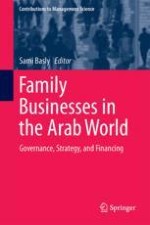2017 | OriginalPaper | Buchkapitel
Family Capital and Organizational Resilience of the Family Firm in Tunisia
verfasst von : Imen Mzid
Erschienen in: Family Businesses in the Arab World
Aktivieren Sie unsere intelligente Suche, um passende Fachinhalte oder Patente zu finden.
Wählen Sie Textabschnitte aus um mit Künstlicher Intelligenz passenden Patente zu finden. powered by
Markieren Sie Textabschnitte, um KI-gestützt weitere passende Inhalte zu finden. powered by
